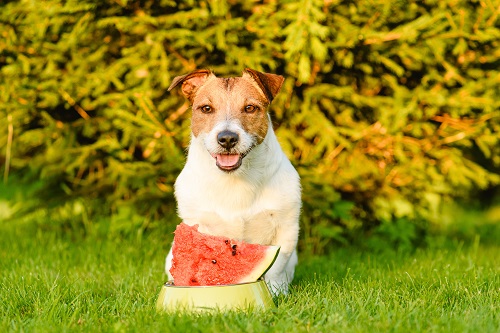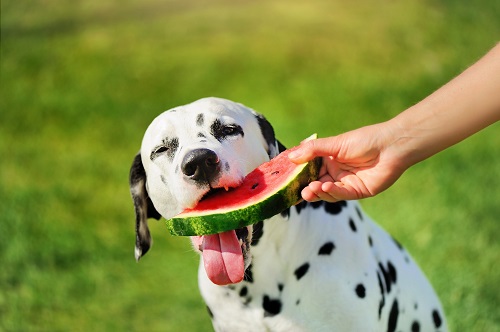Can Dogs Eat Watermelon? Is Watermelon Safe For Dogs? If you have these questions in mind, then we have the answers!

Watermelon is a fruit people often consume during the summer for a refreshing delight. Many people want to share this treat with their furry pals, simultaneously wondering Can Dogs Eat Watermelon? If you are one of them, keep reading to know the answer!
What is Watermelon?
Watermelon is a tropical edible fruit, healthy for dogs to eat. It is a large fruit that grows on a vine-like plant. It is a member of the Cucurbitaceae family, which also includes other fruits like cucumbers, pumpkins, and squash. Watermelon is a popular summer fruit due to its refreshing and juicy nature, and it’s typically eaten raw as a dessert or snack. The flesh of the watermelon is usually pink or red, although some varieties have yellow or white flesh.
Read here about Can Dogs Eat Banana Peels | Are Banana Peels Safe for Dogs?
Can Dogs Eat Watermelon?
Yes, dogs can eat watermelon in moderation. Watermelon is safe for dogs to consume as long as it is offered in the right way. Watermelon is low in calories and fat, and it contains vitamins and minerals that can be beneficial to dogs.
Health Benefits of Watermelon for Dogs
Watermelon can provide some health benefits for dogs when offered in moderation as a treat. Here are some of the potential health benefits of watermelon for dogs:
- Hydration: Watermelon is high in water content, which can help keep dogs hydrated. This is especially important during hot weather or if your dog is active and exercising.
- Vitamins and minerals: Watermelon contains vitamins A and C, as well as potassium and magnesium, which can help support your dog’s overall health.
- Low in calories: Watermelon is a low-calorie treat that can be a healthy alternative to high-calorie snacks. This can be beneficial for dogs who are overweight or who need to maintain a healthy weight.
- Antioxidants: Watermelon contains antioxidants that can help protect against cellular damage and may help prevent certain diseases.
It’s important to keep in mind that watermelon should be offered in moderation and as a supplement to a well-balanced diet. While watermelon can provide some health benefits for dogs, it does not contain all the nutrients that dogs need to stay healthy.
Read here about Can Dogs Eat Butternut Squash | Is Butternut Squash Safe for Dogs?
A Few Health Concerns Of Watermelon
While watermelon can provide many health benefits, there are a few health concerns to keep in mind:
- Overconsumption: Like any food, overconsumption of watermelon can lead to digestive upset and diarrhea. It’s important to offer watermelon in moderation as a treat or supplement to a well-balanced diet.
- Allergic reactions: While rare, some dogs may be allergic to watermelon. Signs of an allergic reaction can include itching, swelling, and difficulty breathing.
- Cyanide toxicity: While it’s unlikely that a dog would eat enough watermelon seeds to cause cyanide toxicity, it’s still best to avoid them altogether. Cyanide toxicity can cause serious health problems and can be life-threatening.
- Digestive issues: The rind of the watermelon can be tough for dogs to digest and may cause digestive upset. Additionally, the high water content of watermelon can lead to diarrhea if given in excess.
If you have any concerns about your dog’s diet or health, consult with your veterinarian.
Can Dogs Have Xylitol Poisoning?
How to Offer Watermelon to Your Dog?
While watermelon can be a healthy snack for dogs, it’s important to offer it in a safe and appropriate way. Here are some tips for offering watermelon to your dog:
- Make sure the watermelon is ripe and seedless. Seeds can be a choking hazard for dogs, and unripe watermelon can cause digestive upset.
- Cut the watermelon into bite-sized pieces that are appropriate for your dog’s size. For smaller dogs, you may need to cut the pieces even smaller.
- Offer the watermelon as a treat or snack, rather than as a meal replacement. While watermelon is low in calories and high in water content, it does not contain all the nutrients that your dog needs to stay healthy.
- Watch your dog while they eat the watermelon, and be sure to discard any uneaten pieces. This can help prevent choking or digestive issues.
- If your dog has never had watermelon before, start with a small piece and monitor their reaction. Some dogs may not tolerate watermelon well, and it’s important to watch for signs of digestive upset such as vomiting or diarrhea.
Overall, watermelon can be a healthy and refreshing snack for dogs when offered in moderation and with care.
Why Should You Avoid Watermelon Rinds and Seeds?

Watermelon rinds and seeds should be avoided because they can be difficult for dogs (and humans) to digest and may cause digestive upset. The rind of the watermelon is tough and fibrous, and dogs may have trouble chewing and swallowing it, which could lead to blockages in the digestive system. The seeds of the watermelon can also be a choking hazard and may cause intestinal blockages.
Additionally, watermelon seeds can contain small amounts of cyanide, which is toxic to dogs and can lead to serious health problems. While it’s unlikely that a dog would eat enough watermelon seeds to cause cyanide poisoning, it’s still best to avoid them altogether.
Overall, it’s best to remove the rind and seeds from the watermelon before offering it to your dog as a treat.
Read here about Dried Fruits Dogs Can Eat | Can Dogs Eat Dried Fruits?
Quick Takeaways
In adherence to the don’ts, you have the best answer to your question, Can Dogs Eat Watermelon? Dogs can eat watermelon in moderation as a treat or supplement to a well-balanced diet. Remove the seeds and rind before offering watermelon to your dog to prevent choking and digestive issues. Watermelon is low in calories and fat and contains vitamins, minerals, and antioxidants that can provide some health benefits for dogs.
However, overconsumption, allergic reactions, cyanide toxicity, and digestive issues are all potential health concerns associated with watermelon. Monitor your dog’s reaction when offering watermelon, and consult with your veterinarian if you have any concerns about your dog’s diet or health.
We’d love to hear what you think! Please share your feedback with us and help us make your experience even better.
